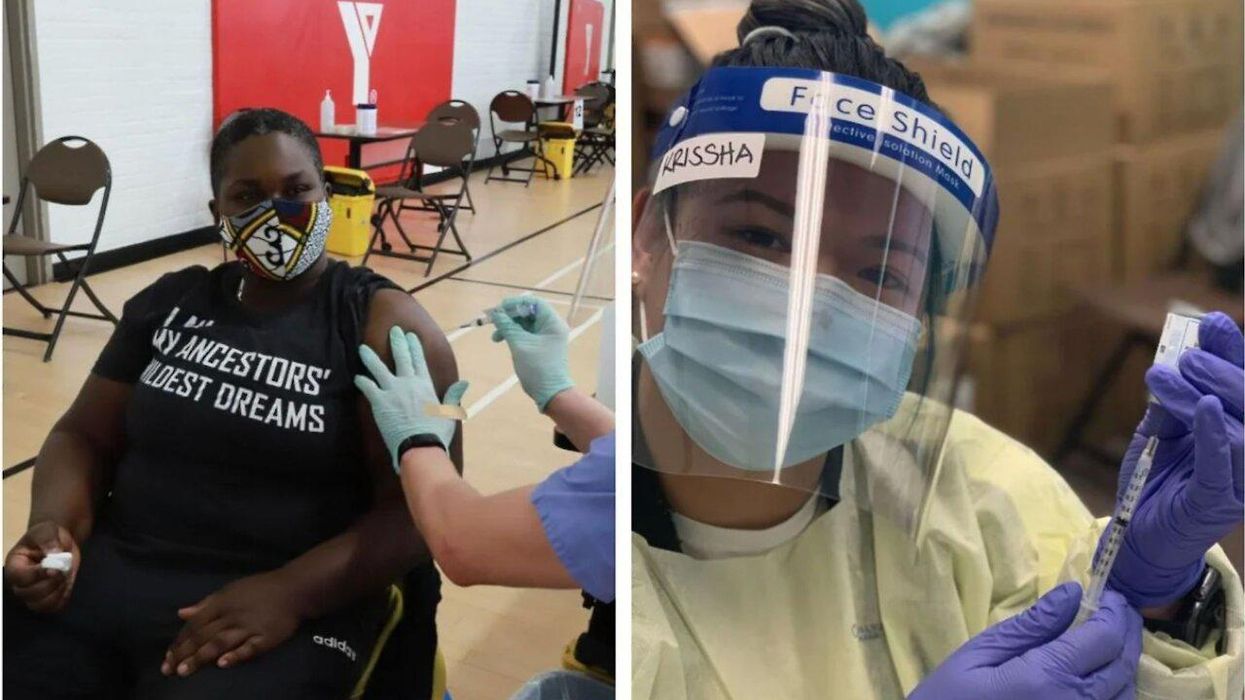Here's Canada's Official Advice On What To Do During & After Getting Your COVID-19 Vaccine
There are tips and tricks for managing a sore arm after first and second doses.
If you're wondering what to expect after getting a COVID-19 vaccine dose, Canada has advice on how you can make it a comfortable experience and what you should do once you get one.
The government has tips on things to do during your appointment so that it goes smoothly, information about possible side effects after first and second doses and guidance on what happens after you're fully vaccinated.
What can you do while getting a COVID-19 vaccine?
If you're afraid of needles or worried about feeling pain and discomfort when getting a dose, the federal government has a couple of techniques you can use to make the experience more comfortable.
You can wear a short-sleeved or loose-fitting top so there's easy access to your arm, sit upright in the chair, relax your arm by letting it feel loose, breathe deeply, and read, listen to music or have a conversation with someone to distract yourself.
Canada also recommends telling the person who's administering the vaccine dose if you feel dizzy or lightheaded before or while you're receiving your dose.
What should you do after you get a vaccine dose?
The government says it's normal to have temporary side effects after getting a vaccine and that they can last for a few hours or even a few days.
At the injection site, you might experience redness, soreness and swelling, or get flu-like symptoms including chills, fatigue, joint pain, headache, mild fever and muscle aches.
According to the government, you can take medicine after you get a dose to help with any pain you have or to lower a fever if you have one. However, you should ask your health care provider for what they recommend to manage short-term side effects.
Other things you can do to care for yourself after getting a vaccine include applying a cool, wet washcloth over the injection site, exercising the arm where you got the injection and drinking lots of fluids.
Canada says to call 911 immediately if you develop any serious symptoms or side effects.
What can you do once you've received a vaccine?
Since most COVID-19 vaccines require two doses, Canada is reminding everyone who gets the first shot of a two-dose vaccine — the Pfizer or Moderna vaccines, for instance — to return for their second dose when it's time to do so.
Once you've received the full series of a vaccine at least 14 days earlier, there are a bunch of different activities you can do without having to wear a mask or be distanced from others according to guidance from the Public Health Agency of Canada. That includes hugging and indoor gatherings with a small group of fully vaccinated people.
While Canada has given the green light for fully vaccinated people to go without masks and distancing in some situations, the World Health Organization has said last month that it's "extremely important" that fully vaccinated people continue to wear face coverings and keep up physical distancing because of the Delta variant.
Canada has received over 66 million doses, which is enough to be able to fully vaccinate every eligible person in the country and because of that, Justin Trudeau said there are "no more excuses" for people to not get vaccinated.
Fully vaccinated Canadians, along with others who are eligible to enter the country, can skip quarantine when arriving here by proving that they've been immunized through the ArriveCAN app.
- Is The COVID-19 Vaccine Mandatory In Canada? No Says The PM ... ›
- Life After A Vaccine In Canada Roadmap Says What You Can Do - Narcity ›
- COVID-19 Vaccine Should Be Mandatory For Health Workers, Ontario Nurses Say - Narcity ›
- COVID-19 Vaccines Will Be Mandatory For Federal Workers & Here's What Happens If They Refuse - Narcity ›
- COVID-19 Vaccines Will Become Mandatory For Some Canadians & Here’s What We Know - Narcity ›
- COVID-19 Vaccine Third Dose Are Available To These People - Narcity ›
- COVID-19 Vaccine Will Not Affect Your Fertility, Says Top Doc - Narcity ›
- Here's How You Can Prove You've Received The COVID-19 Vaccine In Alberta - Narcity ›
- COVID-19 Vaccines Can Change The Length Of A Person's Menstrual Cycle, A New Study Says - Narcity ›
- Canada COVID-19 Vaccine Could Be Approved By Summer - Narcity ›
- COVID-19 Cases in Canada Are Almost Only In Unvaccinated People - Narcity ›
- US Is Donating Vaccines To Canada Again & 1 Million Doses Are Coming - Narcity ›
- Canada's Fourth Wave Will Look Different Depending On Vaccination Status, Expert Says - Narcity ›
- Canada’s COVID-19 Vaccine Distribution Is Now ‘Second In The G20’ - Narcity ›
- Second Doses Of COVID-19 Vaccines Should Be Given ASAP, Says NACI - Narcity ›
- Vaccine Hunters Canada Shares How To Get Vaccine Info For Your Area - Narcity ›
- Over 200 People In Niagara Have To Get A Repeat COVID-19 Vaccine Dose After Saline Mix Up - Narcity ›
